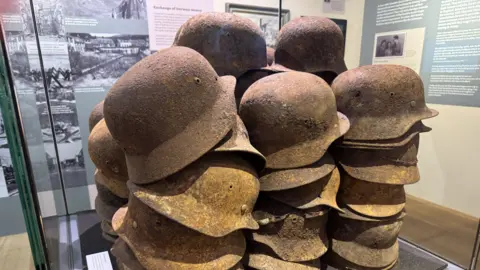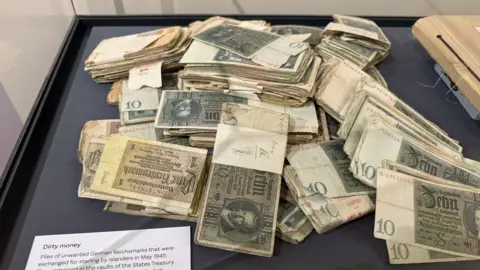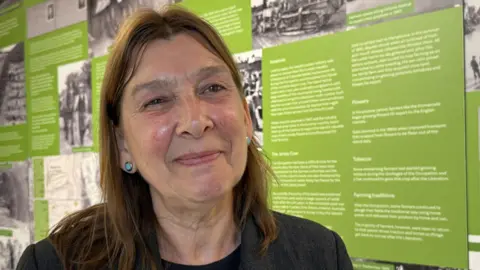Liberation: 80 years since the Germans left Jersey
 BBC
BBCTwo new exhibitions have opened looking at what life was like on the Channel Island of Jersey following liberation from German occupation at the end of World War Two.
One of them, at the Jersey Museum, features a number of artefacts which have never before been seen in public.
They include helmets abandoned by German soldiers and stacks of German Reichsmarks exchanged for pounds sterling by islanders in May 1945.
It was the first time that liberation had been taken as a starting point for historical exhibitions and exploring how life on the island had to be rebuilt following the ravages of war, organisers said.

It is believed that about 10,000 people left Jersey when it was announced that German troops would be taking control of the island.
Many families were separated - some of them unintentionally - and the challenge of reuniting as a family unit and establishing a routine was particularly difficult after five years apart.
There was also hostility and suspicion towards individuals who were suspected of collaborating with the Germans.
Life After Liberation at the Jersey Museum, looks at how the island grappled with such issues as it attempted to recover and rebuild.
Farms near collapse
At Hamptonne Country Life Museum, farming before and after the occupation is the focus of its new exhibit.
Following the war, there were fears that decimated farms would never bounce back to their pre-war production levels.
Julia Coutanche's, whose mother lived at Hamptonne, was eight or nine years old when the Germans arrived in July 1940.
Due to their commitments on the farm, her family could not flee the island, and they were forced to share their home with the occupying German forces.

She said: "Towards the end of the war, the German soldiers were starving, even more so than the locals, because at least the locals eventually got their Red Cross parcels.
"There was a German stationed in the road in front of my grandparents' house and my gran took pity on this 17-year-old who was, you know, a boy, really; not even a man, and was really hungry.
"So she would apparently lower a bottle of milk from her bedroom window for him to take in the dark at night.
"He returned to Jersey years later, met my auntie and uncle, and claimed he really believed that milk was what saved him because he was just so, so hungry."
'Make do and mend'
She said that the lessons learned during the occupation would prove important in the post-war years as farms tried to recover from near-collapse.
She said: "Before the occupation, Jersey would have just been so quiet. Horses rather than machinery on the farm.
"Everyone ate seasonally locally and I suppose the big lesson [was] not wasting anything, make do and mend, and a real sort of bonding between people.
"The important things in life".
The two exhibitions run until the end of the year.
Follow BBC Jersey on X and Facebook. Send your story ideas to [email protected].
